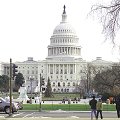- By The Office of Congressman Tom Reed
- News
 Print
Print  Congressman Tom Reed today formally established and hosted the first event of the Private Property Rights Caucus in the House of Representatives. The idea for the caucus came out of a recent roundtable Reed held with farmers and local officials in Allegany County. Fourteen Members of Congress from eleven states ranging from Maine to Arizona join Reed as original members of the caucus.
Congressman Tom Reed today formally established and hosted the first event of the Private Property Rights Caucus in the House of Representatives. The idea for the caucus came out of a recent roundtable Reed held with farmers and local officials in Allegany County. Fourteen Members of Congress from eleven states ranging from Maine to Arizona join Reed as original members of the caucus."We are hearing not only from New Yorkers but from Americans across the country about how important it is to defend the rights of property owners from an overreaching federal government," Reed explained. "The Private Property Rights Caucus will provide a platform to educate Members of Congress on the egregious actions that government at all levels imposes on property owners and how we can protect property owners' Constitutional rights as granted by the Fifth Amendment."
In January Reed introduced the Defense of Property Rights Act to provide property owners with an opportunity to seek compensation in Federal court when government action significantly impairs the value of their land. "We care about defending the Constitutional rights given to all Americans and future generations," Reed declared. "This is an issue that effects Americans from rural communities to urban centers across the nation. We need fairness and respect for private property. We also need government at all levels to carefully consider the impact that regulatory actions have on property rights and property values."
The Statement of Purpose for the Private Property Caucus is as follows: "The purpose of the Private Property Rights Caucus is to educate Members of Congress and their staff on the importance of property rights to a free society, how landowners across the country are being impacted by government action and to raise awareness of the issues Congress must address to protect Americans' rights to their property."
Wednesday's event featured a roundtable discussion of avenues to study for House action to protect property rights through regulatory reform, judicial process reform and considering individual statutes which affect property owners.
v11i17



